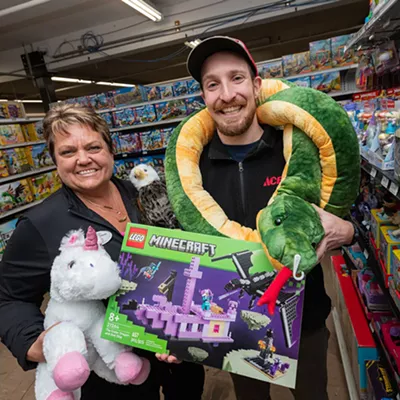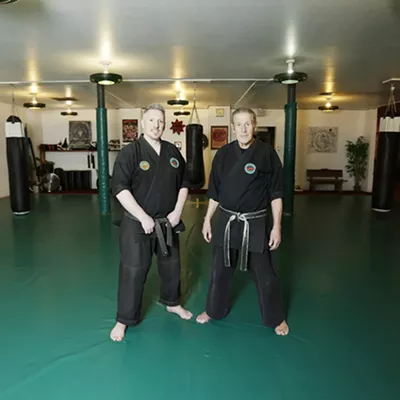A little over two decades ago, a landmark study conducted by The Centers for Disease Control and Prevention and the Kaiser Permanente health care organization helped to mainstream the concept of adverse childhood experiences, or ACEs for short.
ACEs are the traumatic events during a child's formative years that may put them at higher risk of a variety of negative outcomes later in life. Domestic violence, homelessness and emotional neglect are all examples of ACEs. The effects can be pervasive. In the short term, a child's academic performance may suffer, while later there's an increased risk of mental health issues and physical challenges such as cardiovascular disease and diabetes.
Ongoing research has also shown that the effects of ACEs are cumulative. So, the higher the number of ACEs in an individual's life, the greater the chances they will encounter those negative outcomes. It's like each withering adverse experience leaves them less equipped to weather the next one.
What can be done? Of course, preventing adverse events altogether is optimal but discouragingly difficult. And childhoods go by in the blink of an eye, so time to intervene is short. Researchers wondered if adding positive experiences might help. Would something like "PCEs" act as a counterweight to ACEs?
A 2019 report published in JAMA Pediatrics by a group of researchers from the Johns Hopkins Bloomberg School of Public Health suggests that there might be something in this more hopeful line of thought.
By studying data from the 2015 Wisconsin Behavioral Risk Factor Survey, researchers found that respondents who reported more positive childhood experiences were far less likely — 72 percent, in fact — to experience depression or poor mental health as an adult. Just as ACEs can chip away at our innate ability to cope with trauma, it appears that positive experiences can help bolster this ability, often called resilience.
Vinny Alfonso, a professor at Gonzaga University's School of Education explains it this way: "For hundreds of years in medicine and psychology, we've focused on indicators of health. But an indicator of health is the absence of disease or the absence of a psychological disorder," he says.
"Well, that's OK, but what about the presence of health and healthy behaviors? I don't smoke, but is that enough for me to be healthy? No! I need to exercise. I need to watch my diet and eat the right foods. So the measure of health is not just the absence of something negative. It has to be the presence of something positive."
To foster the presence of positive behaviors and resources, Alfonso proposes switching to a prevention mindset. That doesn't necessarily mean preventing ACEs from taking place — at least not at first. Rather, it's about bolstering resilience in children to better enable them to deal with ACEs. In time, that collective resilience is what will curtail the generational cycle of ACEs.
"I am not anti-ACEs or anything. I believe they exist and that they are dangerous, especially when they're accumulated. I take them seriously," he says.
"However, I'm coming from a strength-based position. We read it all the time: The earlier we detect cancer, Alzheimer's, Parkinson's, all these terrible diseases, and the earlier we intervene, the better. Basically, my read on all of this is that the more we can prevent from happening, the healthier we are as a society — physically, psychologically, economically, socially."
As an example of this preventative approach in action, he points to the proven efficacy of early childhood education. Programs like Head Start have been successful in "either preventing academic and social difficulties from happening or changing [an individual's] trajectory" from one that is derailed by ACEs to one that cultivates resiliency.
But Alfonso is quick to note that Head Start or even early childhood education alone isn't enough. True to the African proverb that it takes a village to raise a child, resilience is more often a product of a compassionate community and a network of resources. Similar to how ACEs may arise out of conditions like poverty and social alienation, conditions like civic involvement and ample support structures tend to create fertile ground for positive experiences.
Additionally, there may be an even more potent factor in countering and ultimately preventing ACEs.
"Resilience develops through multiple pathways. It's at the community level, the system level, the family level and the individual level," says Natalie Turner-Depue, interim director of the Child and Family Research Unit at Washington State University.
"And one of the biggest protective factors is the presence of a safe, stable, nurturing relationship. That's why there's now a lot of focus on the power of positive relationships with and among children in their development as a mitigating factor against negative outcomes resulting from the impact of trauma."
Having studied those impacts and the complex web of interconnections that lead to ACEs, Turner-Depue cautions against ignoring the broad range of environmental factors that can nourish or starve resilience. At the same time, she says a growing body of research suggests that even a single nurturing relationship can combat the toxic effects of multiple ACEs.
"We don't want to oversimplify things and distill it down to the idea that relationship is the key; but really, relationship is the key. And the more often that we can really promote and support building those positive connections for kids at a young age and providing them with opportunities to connect socially, emotionally, relationally with people that are going to be positive influencers in their lives, then that's going to build their protective factors and ultimately build their resilience," she says.
Both she and Alfonso say there are immediate lessons to be drawn from COVID-19 in this regard.
"The last year-and-a-half was a collective trauma," says Turner-Depue. "Through the pandemic, our resilience was diminished because we were all dealing with our own adversity and challenges. During the lockdown, one of the things I heard so often when I was talking to folks was, 'I just want a hug.' And that goes full circle back to how a positive relationship is so critical."
What are ACEs?
Physical, sexual and emotional abuse
Neglect
Losing a parent such as through divorce
Being exposed to domestic violence
Having a parent with a mental illness
Having a member of the household who abuses drugs or alcohol
Having a parent who has been in jail
— The American Society for the Positive Care of Children
Be the One!
Volunteer at a local organization that is creating positive experiences for kids.
Spark Central
Share your time to spark creative learning in arts and technology spark-central.org (509) 279-0299
Big Brothers Big Sisters of the Inland Northwest
Mentor a "little" by meeting two to four times a month, for a minimum of 18 months nwbigs.org (509) 328-8310
Growing Neighbors
Help create "neighborhood families" through growing urban farms in Spokane
growingneighbors.wordpress.com
(509) 327-5522



















